Posts Tagged ‘space’
THE FERRYMAN, A No-Spoiler Review of the Novel
Published in 2023 and still in hardback only, THE FERRYMAN, a novel by Justin Cronin, was a surprise find. My friend tipped me off. She is a serial reader, but normally reads lit fiction. She knows I read science fiction and speculative stuff. This book is science fiction and I’m not spoiling here. The first hint of a future/science fiction reality comes in the prologue. For the beginning half of the of the novel I was captured by the beauty of the writing. However, it’s always difficult to write a great ending, and THE FERRYMAN’s story/plot is complicated, very complicated and I’m not sure Cronin pulled it off.
First the Short Review: I Recommend THE FERRYMAN with Reservations
- Overall, lovely writing
- Suberb mystery and tension
- Interesting world-building
My Reservations:
- This is a long book, many words. Did it need to be this long?
- The last 1/3 of the book is a lot of explaining…the mysteries are not easily unwound and I’m still not sure I really get the ending
But still…it was a fun read. Here is one example of lovely writing in an early chapter:
“It came as a pleasant shock to me, how the man I’d known as a rather dry intellectual transformed himself so completely into a craftsman–a man who actually made things that the world could put to practical use Which only goes to show that people are more complicated than they let on and that even tragedy (sometimes only tragedy) can open the door to who we really are.”
This idea that tragedy opens up doors to identity is a theme that runs through the novel.

The Longer Review:
THE FERRYMAN’s setting is the fodder for much of the good writing. Prospera, a temperate island utopia, is home to a class of people known as Prosperans. Think Brave New World. Its inhabitants not only live and eat like royalty, they never die. In this world a technology exists that transfers the consciousness of an elder individual into a new body. Much of this process is surrounded in mystery because when the transfer takes place, memories are also wiped.
The new consciousness in a new body is in theory “the same person” being reborn, but without the baggage of memory. So is it really the same person? The reader wonders. For example, the main character, Proctor Bennet, dreams, and his dreams indicate a previous life, perhaps? Mysterious, though Prosperans are not supposed to dream. Something is amiss with Proctor Bennet.
Moreover, all is not well in Prospera. This becomes clear early in the story and drives much of the tension. There are other oddities in this world. Children with the re-inserted consciousness come from across the water on ferries at an older age, not as babies. All Prosperans have monitors inserted into their arms that measure their health and well-being. More importantly, an underclass of people perform the menial work on the island. These people have children naturally, live in a slum called the Annex, and do not seem to have access to the life-preserving technologies of the Prosperans. However, they make great art…an interesting discovery along the way, that those living in the Annex (as opposed to the Prosperans) live deeper lives, even though they are the underclass in society.
Proctor Bennet is a ferryman. He assists elders in the society who are ready to “end” their current lives. All this is done calmly, with signed contracts and quiet ceremony. When his own father is ready to board the ferry, Proctor is called and escorts his father to the ferry until his father unravels. A “scene” at the ferry is exactly what the Properans hate. Proctor’s experience around his father’s ugly departure across the sea thrusts him on a fact-finding mission. Clues emerge all around him. It’s around this section of the novel that I got the feeling there was glitch in the Matrix.
Except, the Matrix did the explaining soooo well. Maybe, this was because the Matrix was a film and not a novel. The backstory that unfolds in THE FERRYMAN is convoluted and complicated. The layers upon layers eventually are revealed, but the revelation felt forced to me, and so much less interesting than the setup. There was also a degree of cliche that felt disappointing to me. Same old, same old villains. Same old, same old catastrophe that set the thing in motion. All this is revealed by lots of explaining and lots of people having conversations with one another. Certainly, there needed to be some of this, but I felt there was too much. The style reminded me of Asimov, who loves to put two “smart” people (usually dominant white males) in a room together talking about and therefore telling the audience what’s going on. I’m not a fan of the style. So…those are my hangups. I think many will love this book. I know folks who adore Asimov for his ideas (if not his writing), but if I were you, I would maybe wait for the paperback, or pick up the audiobook…THE FERRYMAN could be fun to enjoy on a very very long road trip.
RED MARS, by Kim Stanley Robinson, A No-Spoiler Review of the Classic Scifi Novel
The Short Review
5 reasons RED MARS is a must-read for the scifi fanatic and anyone remotely interested in planetary geology:
- RED MARS is a KSRobinson classic, published in 1992 and winner of the Nebula and the first of his acclaimed Mars Trilogy
- The story imagines life on Mars in a way that feels scientifically viable and compelling, therefore relevant to the current and growing conversation around Mars exploration
- Scientists are the narrators of this story. They are also the heroes, sometimes the villains, the problem solvers and the work horses. I was especially drawn to the “builder” character, Nadia
- The planetary geology content, naturally integrated into the story, is breathtakingly fun
- Despite being over 170K words long, KSR does not get bogged down in the “how would that ever be possible” science scenarios, but drives the story forward through characters and the politics that pressure a budding Martian community
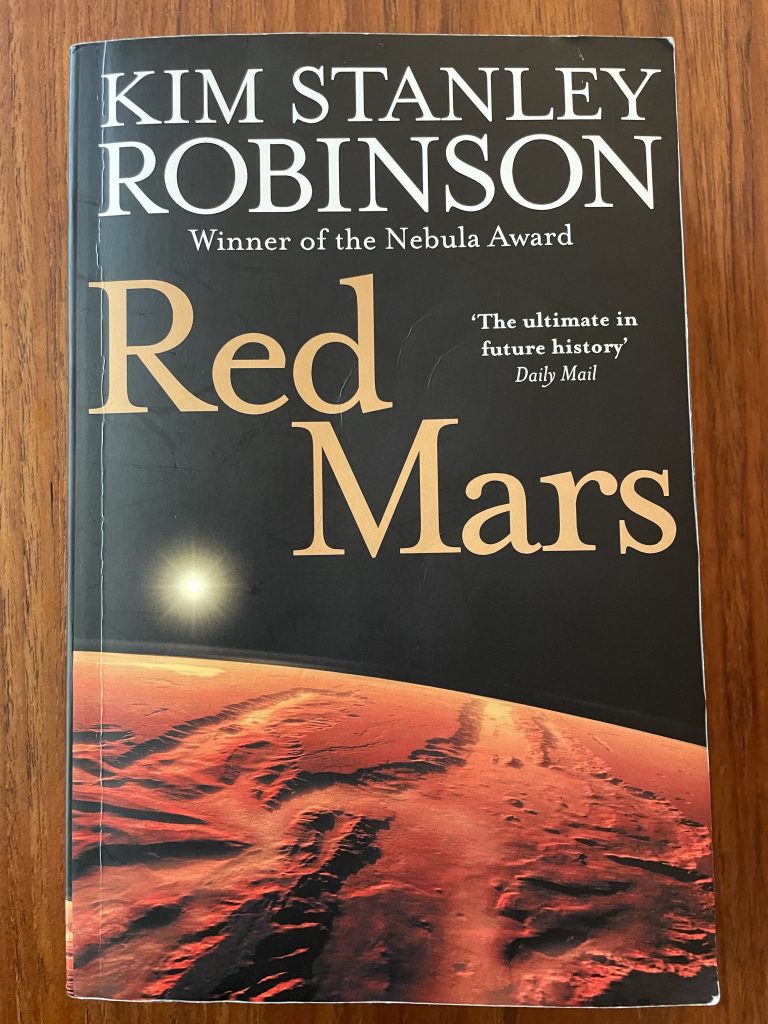
The Longer Review
RED MARS tells the story of the first 100 scientists sent to Mars by a multi-national Earth entity called UNOMA, United Nations of Martian Affairs. The story PG-13 (for some sexual content) follows about 10 of those scientists closely, though many others are referred to and are part of the action in direct and indirect ways. The novel is broken up into eight parts and each of the parts has a different primary narrator. I do think Robinson’s choice on point of view works in a novel this long, adding a level of complexity and depth to the very audacious idea that Mars might be “tamed” by human beings. Robinson plays with themes around the idea that really smart people might be able to build a better civilization from scratch, and form some kind of utopia, but does not make the task easy on the idealogues within his story.
Various characters, all of whom are scientists in one discipline or another, give voice to ideas of alternative governing and living environments. The sharing of abundant resources is the initial reality for the first 100, but eventually, when new groups arrive on Mars, the corporations who have funded the exploration and building, come calling for the planet’s vast natural resources.
The conflict that arises is somewhat predictable and draws out the best and worst of the people in charge who are trying to manage a fragile, but quickly expanding human presence on Mars.
Meanwhile, Earth is falling into total chaos. Robinson does not spend any time showing the reader Earth itself, but shows it via news stories viewed by the inhabitants of Mars. Earth’s chaos is also a reason why many thousands of migrants are streaming to the new world. Robinson does lean left in his politics (proudly so) and sees corporate giants as the villain, though the villain is also amorphous in the story. Robinson’s ideas don’t come across as preachy to me. He’s a deep thinker and a thoughtful writer, so he understands the grittiness of governing and the probable impossibility of building that utopia even if one does start with 100 brilliant scientists.
Many science fiction readers will not mind the length of RED MARS, but at times, I confess to being a bit bored and wondered…Where is this story going? However, I did stick it out and the payoff was decent. It stands alone as a novel, without the kind of cliffhangers that drive you to the second book. Will I read the next two books in the trilogy? Probably yes, but not this summer.
1899, A No-spoiler Review
If you liked the television series LOST and you’re a fan of Baran bo Odar and Jantje Friese (creators of DARK) you will want to log into to your Netflix account and start streaming 1899 now. With that said, I give warning, a second season was not renewed. For some, this will be a reason not to watch. However, I wonder if buzz about the show might result in the approval of a second season. I hope so because I really want to understand this world that falls into the category of mystery/paranormal/science fiction.
First, the short review
4 Reasons to Watch the series, 1899
- Excellent production overall, with creepy settings and period costumes
- Well-acted by a diversity of performers, many of whom are new to the American audience, though a few starred in DARK
- Lots of tension and mystery
- Claustrophobic and isolating setting. Ocean-going vessel all alone on the open seas (well…sort of alone)
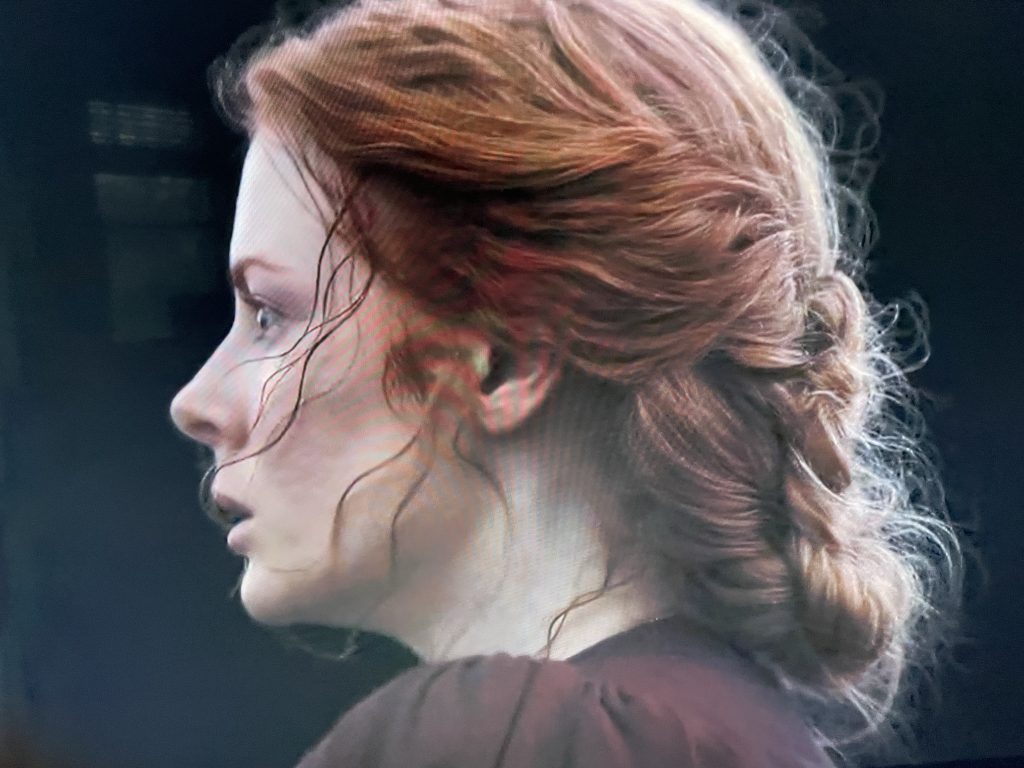
A Longer Review
1899 is free to Netflix subscribers. Eight episodes make up the first season. I rate it R for sexual content and some violence.
Baran bo Odar and Jantje Friese bring to the screen this mind-twisting mystery with a style that broods and draws in its audience. That style will be familiar to fans of Odar and Friese’s imaginative work in the time-travel story, DARK.
1899 opens with the main character, Maura Franklin-Singleton, played by Emily Beecham, waking from a nightmare. The viewer quickly learns that Maura is living in another century. The title of the series is a helpful reference point as are the period costumes. Maura is also aboard an ocean liner with hundreds of other passengers, on its way to America from Europe. She appears to be traveling alone.

From the first moment of the longer narrative arc, confusion about reality is introduced to the viewer through the character of Maura. Her nightmare before waking is a terrifying scene in what seems to be a sanitorium for the mentally ill. She is strapped into a chair and given an injection while the command WAKE UP jolts her out of sleep and into the “real” world. The audience, along with Maura, sense the nightmare holds a degree of reality as she views the red marks on her wrists, where in the nightmare, she was strapped to the chair. She quickly covers those up with her long, victorian sleeves, and heads to the ship’s upper-class dining hall. To add drama to this ship’s community at large, there is a large portion of underclass people living below deck for the duration of the cruise.
Waking from a dream becomes a thread throughout the story as other characters, some of her fellow travelers, experience dreaming and waking to the same command, WAKE UP. The stories of these characters are slowly woven together into a climax that truly surprises.
PERELANDRA, A Review
PERELANDRA is the second installment in CS Lewis’ space trilogy. Below is my no-spoiler short review, but the longer review that follows the image of PERELANDRA’s cover, will contain spoilers…beware. This is not a children’s book, but I recommend this novel to all ages who like the story. For all readers, taking the time to discuss after or along the way will deepen philosophical and theological understanding.
Link to OUT OF THE SILENT PLANET for a review of the first book in the trilogy.
5 Reasons to Read PERELANDRA, A Classic Science Fiction Story
- One of the more unique portrayals in literature of paradise and/or a pre-fallen world
- Beautiful CS Lewis prose
- The ideas are put forward clearly and by someone well acquainted with 20th century ideas
- Finally…a strong female character (there were none in the first novel)
- Read all three to make sense of what Lewis was trying to accomplish in the longer narrative arc
3 Reasons PERELANDRA is My Least Favorite of the Trilogy
- There are so few characters and the villain does not arrive until about 1/3 of the way into the book
- Not a lot of drama…there is a slow build and eventually, high drama, but it takes the novel a while to arrive (see #1)
- A lot of speech-making in the final pages. Interesting ideas, but coming at me in my least favorite non-dramatic package
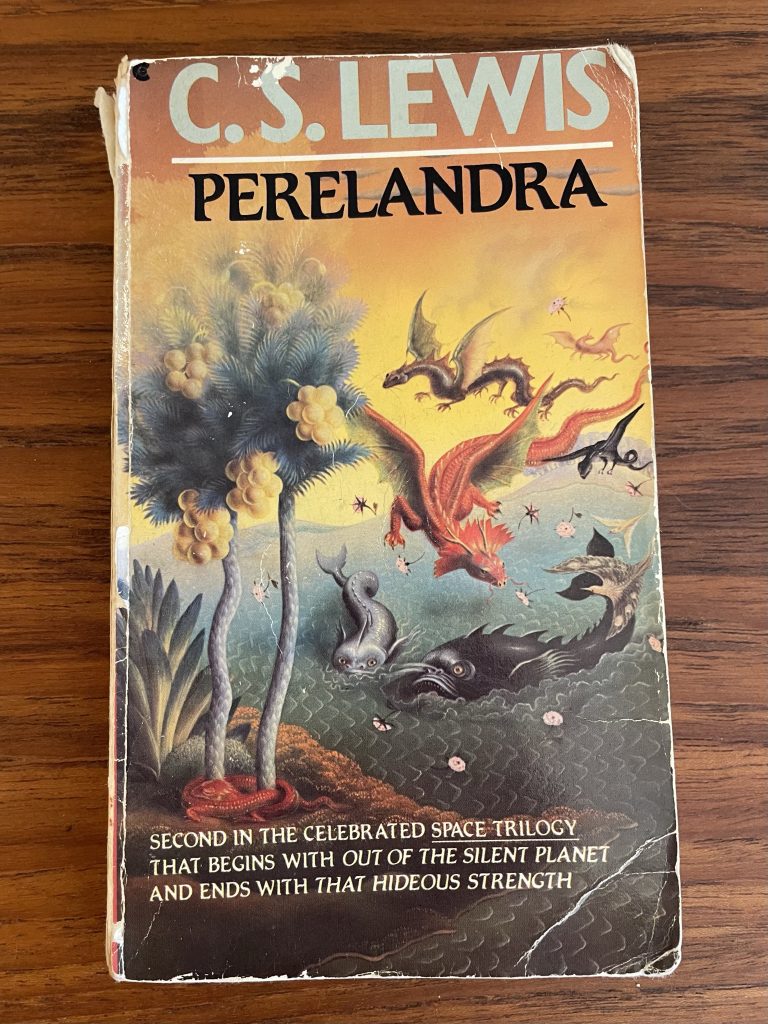
The Longer Review (With Spoilers)
While PERELANDRA is my least favorite of the three books Lewis wrote in the scifi genre, it does have its merits.
For one, anyone who has read his Narnia books, knows how well CS Lewis puts his imagination on the page. He has the ability to create a world both strange and fabulous and took on a bold task to put before the reader a paradise, a pre-civilization and pre-fallen planet with only two human-like people. Basically, he created an Eden. And how would one write this in a convincing way?
This excerpt, one of many examples…just gorgeous.
Now he had come to a part of the wood where great globes of yellow fruit hung from the trees–clustered as toy-balloons are clustered on the back of a balloon-man and about the same size. He picked one of them and turned it over and over. The rind was smooth and firm and seemed impossible to tear open. Then by accident, one of his fingers punctured it and went through into coldness. After a moment’s hesitation, he put the little aperture to his lips. He had meant to extract the smallest experimental sip, but the first taste put his caution all to flight. It was, of course, a taste, just as his thirst and hunger had been thirst and hunger. But then it was so different than any other taste that it seemed a mere pedantry to call it taste at all. It was like the discovery of a totally new genus of pleasure, something unheard of among men, out of all reckoning, beyond all covenant. For one draught of this on earth wars would be fought and nations betrayed.
Elwin Ransom, a professor of philology, is the narrator here. He was also the protagonist in Out of the Silent Planet. In this excerpt, he is telling his tale to a fictionalized version of CS Lewis after returning from his mission to the planet Perelandra. Ransom was sent to Perelandra by the angelic ruler of Mars (Malacandra). The reader is acquainted with this ruler from the previous book. In Out of the Silent Planet, Ransom is kidnapped and brought to Malacandra. That is where he meets Oyarsa, the ruler of Mars. Oyarsa does make an appearance in this novel, as does Weston, one of the academics who kidnapped Ransom in the first story. Weston, the primary rival to Ransom, acts as the tempter in this narrative. He does this not by his own cleverness and strength, but by something more frightening. Weston has given himself over to the bent angelic ruler of Earth, Satan. After Weston arrives on Perelandra in his space vessel, Ransom comes to understand his mission, that he has been sent to thwart the bent Oyarsa by thwarting Weston.
In the story, Weston is an academic with the worst intellectual vices; hubris combined with a flamboyant humanism that borders on narcissism. Tragically, he falls under a true evil in his search of spiritual answers to the mysteries he experienced on Malacandra. Weston’s journey into evil reads like something out of a horror novel (or the Bible).
“Idiot,” said Weston. His voice was almost a howl and he had risen to his feet. “Idiot,” he repeated. “Can you understand nothing?…This is the old accursed dualism in another form. There is no possible distinction in concrete thought between me and the universe. In so far as I am the conductor of the central forward pressure of the universe, I am it. Do you see, you timid, scruple-mongering fool? I am the Universe. I, Weston, am your God and your Devil. I call the Force into me completely…”
Then horrible things began happening. A spasm like that preceding a deadly vomit twisted Weston’s face out of recognition. As it passed, for one second something like the old Weston reappeared–the Old Weston, staring with eyes of horror and howling, “Ransom, Ransom! For Christ’s sake don’t let them—” and instantly his whole body spun round as if he had been hit by a revolver-bullet and he fell to the earth, and was there rolling at Ransom’s feet, slavering and chattering and tearing up the moss by the handfuls…
I was in my thirties the last time I read PERELANDRA and I did not remember how clearly this Weston character gives himself over to evil. Nor did I remember that Ransom comes to the realization that he will have to destroy Weston in hand to hand combat if he is to defeat him.
That Ransom believes he must assassinate his rival provoked my horror. Moreover, the scenes of his battle with Weston are brutal. Lewis does not hold back on that reality, but the idea of this existential battle brought to mind Dietrich Bonhoeffer. Lewis might never have known Bonhoeffer personally, but the ideas Bonhoeffer was writing about and preaching about (in Hitler’s Germany) were likely familiar to him…as they were to every thinking Christian of the time.
Bonhoeffer, while struggling to be a faithful clergy member under Nazi rule in Germany, came to terms with the idea that it was in fact a righteous or just act to kill a man who had fully given himself over to evil. That is why Bonhoeffer was executed in the end, as he played a role in an assassination attempt against Hitler. Below is an excerpt of a sermon on Colossians 3:1-4, a sermon he gave most likely after he had made the decision to collaborate with a part of the resistance determined to assassinate the Fürher.
“Instead, and precisely because our minds are set on things above, we are that much more stubborn and purposeful in protesting here on earth… Does it have to be so that Christianity, which began as immensely revolutionary, now has to remain conservative for all time? That every new movement has to blaze its path without the church, and that the church always takes twenty years to see what has actually happened? If it really must be so, then we must not be surprised when, for our church as well, times come when the blood of martyrs will be demanded. But this blood, if we truly have the courage and honour and loyalty to shed it, will not be so innocent and shining as that of the first witnesses. Our blood will be overlaid with our own great guilt.” (DBW 11, 446) (Schlingensiepen, Kindle Location 2427)
Bonhoeffer’s words evoke the idea that a conservative church is potentially an anemic one. His mention of our great guilt in the sermon I took two ways. One, the church is guilty when it does not act (or waits too long) to stand up to evil. Two, if it does join the revolutionaries, it potentially falls under the guilt of questionable acts. When evil can only be defeated by an act that lays outside of the norm of Christian ethics, there is plenty of guilt to go around. However, Bonhoeffer did not shrink back from taking on that guilt for what he (and history) thought to be the greater good. Moreover, his writings on this remain strong pillars in just-war theory and the Christian struggle with realism versus pacifism.
Lewis travels a similar line of reasoning in this novel and it should not surprise the reader that when the character Ransom leaves the planet Perelandra, he leaves having accomplished his task, but with a wound on his foot that refuses to heal this side of heaven.
OUT OF THE SILENT PLANET, A No Spoiler Review
OUT OF THE SILENT PLANET, by CS Lewis came about as a result of a coin toss between JRR Tolkien and CS Lewis in the 1930s. The understanding between the two men; one side of the coin would mean writing a science fiction novel, the other side would mean writing a time travel novel. The coin was tossed, Lewis was assigned the scifi novel. Tolkien was assigned the time travel novel. Tolkien never wrote his. Lewis did, published in 1938, twelve years before Narnia. In fact, he wound up writing three books of science fiction. OUT OF THE SILENT PLANET, which I will review here, was the first. This story is sophisticated, but there is no reason a YA reader or a very learned middle grade reader cannot take on this story. For educators thinking about assigning this book to a young person, a solid discussion on the story would make the experience a profound one.
The Short Review: 4 Reasons to Read OUT OF THE SILENT PLANET
- Superb writing and because this is CS Lewis, when you’re finished reading, your brain will have expanded
- Scintillating ideas that awaken the conscience…Plunge yourself into the mindset of a WWI veteran and a brilliant observer of history and soak in Lewis’ crucial critique of pre-WWII Europe
- Absorb Lewis’ Christian concept of God/Creator…the beauty and the moral implications
- Gain a vision for the power of fiction (imaginative science fiction in particular) as a way to change hearts and minds.
A Few More Details:
When Lewis and his friend and colleague, JRR Tolkien, both veterans of WWI, decided to toss that coin, they had been musing together about the sad state of fiction. They believed that the godless universe theory unleashed to some degree by Darwinists and proponents of the Hegelian superstate/superman, was giving rise to real beliefs (like eugenics which both understood as dangerous and evil) inside academia and government. More troublesome, these theories were making their way into fiction and infecting the broader population through story.
Americans fought in WWII and helped to defeat Hitler, so my nation (I am a US citizen) often forgets how the eugenics movement in the US was accepted and backed by some of our highest state actors, like President Woodrow Wilson. We in the US forget, maybe conveniently so, that we too were traveling on a similar road as the Nazis. This is how pervasive these ideas were and back in that day, they were considered progressive. It turns out, anything can be labeled progressive. A cautionary and hopefully humbling reminder to us in the 21st century.
Marxist ideology was also suspect in Lewis’ eyes. Both Marxism and Fascism preached an exercising of power where the end justifies the means. That idea was an abomination to Lewis and Tolkien, the rejection of which made its ways into the Lord of Rings trilogy, as it did into all of Lewis’ writings. As Christians (Lewis, an Anglican, Tolkien, a Catholic), they challenged the idea that the state has permission to sacrifice an individual for some greater good, not without that individual willingly giving up her/his life, soldiers willing to fight to defeat the existential enemy of a free state being one example of this proper sacrifice, something both of these men witnessed first hand.
In regard to reading OUT OF THE SILENT PLANET, knowing a little 20th century history and philosophy definitely helps the reader enter into the world of Elwin Ransom, the hero of the story, but even without that knowledge, this is a fascinating and well written tale. Ransom, a philologist, is on a walking tour of rural England. He is kidnapped and taken to Malacandra (the planet Mars). What unfolds is a story about relationship and curiosity (Ransom’s journey) versus dominance exercised by violence (the journey of his kidnappers). The narrative provides a resolution that exemplifies the idea that there is a standard of justice that is literally universal.
This is my third time reading OUT OF THE SILENT PLANET (notice my beat-up copy in the image above…not sure it will survive another read-through) and after finishing the book this round, I found myself dreaming about grace and kindness and goodness while I slept…something that doesn’t often happen for me after reading science fiction before bed.
FOR ALL MANKIND, A No Spoiler Review
Apple Plus released its third season of FOR ALL MANKIND this month. I have not viewed any of the 3rd season but I did watch all of 1 and 2 and loved them. What follows will be the short review and a longer review of season 1 and 2. If you’re convinced by the short review…start watching now. If you need a little more data, the longer review will give you a better idea of why this many hours of consumption might be worth your time. The show is rated R for a few racy sex scenes, but if your young person can handle that, the education piece is interesting. A bit of history can be etched out or explained as some of the “alternative” version comes across the screen. It’s portrayal of communist USSR rings true. It also captures something of the spirit of the age for each decade, especially the urgency around the space race of the 1960s.
The Short Review: 6 Reasons I Recommend FOR ALL MANKIND
- If you love alternative history narratives like The Man in the High Castle, you will appreciate this story
- If you love nostalgia settings and music, think Stranger Things, you will love being immersed in this story-world, which starts in the 1960s, but spans decades.
- Most of us appreciate great casting. FOR ALL MANKIND will not disappoint
- Top-notch production value, this includes the writing, the special effects and the acting
- Good pacing. A lot of action, drama and tension throughout
- A thoughtful story. A sprinkling of social commentary for our current time…some of that commentary I liked, some I felt was contrived, but the ideas are worthy of our attention
The Longer Review: (this review contains a couple of small spoilers)
The USSR and the US are in a space race in this alternative history, set during the cold war. The USSR has landed on the moon first, claimed it as territory, and has aims to build a military compound. This traumatizes the US as a nation. The first episode captures the feeling well as it feels like a gut-punch watching the Soviet flag raised on the moon and hearing the first words of the Russian Cosmonaut as he takes the first steps…The Walter Cronkite figure on the television news reports as follows:
The first man to set foot on the moon spoke just moments ago. “I take this step for my country, for my people, and for the Marxist-Leninist way of life. Knowing that today is but one small step on a journey that someday will take us all to the stars.”
FOR ALL MANKIND was created by Ronald D. Moore (Battlestar Galactica, Star Trek and Outlander), Matt Wolpert and Ben Nedivi. They take the “what if Russia had landed on the moon before we did” scenario and create a similar history to our own, but with differences that intrigue. The writers, I surmise, are progressive in their leanings because progressive values make their way into the script and into a historically white male dominated NASA long before reality. Sometimes, it feels heavy-handed, like the writers are checking the boxes of gender and racial diversity. However, the results do make for a delightfully diverse cast.
In episode 1, the audience meets Margo Madison (pictured above, played by Wrenn Schmidt) at the beginning point of her NASA career where she is the only woman in the male dominated control center. By season 2, she emerges as NASA’s head.
By the finale of season 2, women, a couple of non-binary individuals (though they keep their gender preferences a secret), African Americans and even a Mexican female immigrant who came over the border illegally as a child, are recruited by the NASA of FOR ALL MANKIND. And who can say it might not have been this way had the US felt the pressure of its failure to land first on the moon? Also, the Soviets promote the first female astronaut, shaming the US for its lack of representation.
All the characters are well-drawn and most are courageous and longsuffering in various ways. Joel Kinnaman (The Killing, Hanna and Altered Carbon) plays Ed Baldwin, an astronaut with a big mouth who in a drunken state reveals to a reporter how NASA lost the space race because of an aversion to risk. He is punished for the reveal (taken off astronaut duty and given a desk job), but his words capture NASA’s very real dilemma. In order to stay equal to, or to get ahead of the USSR, risks will have to be taken. Many characters of significance will lose their lives to achieve the elusive prize of space dominance.
This is where the series gives commentary on current society as it poses the questions that plague our century…Who will dominate the future? US and free societies (in general) have dominated the global order since WWII, but that prize came at a great cost to many of our ancestors. We have inherited something hard fought, but that inheritance is being challenged and chipped away by those who see themselves as more deserving of dominance…and perhaps they are, but some moments in history, even national failures, have the capacity to motivate a new generation of warriors. That message shines through in FOR ALL MANKIND.
THE SILENT SEA, More Brilliance From the Korean Film Industry, A No-Spoiler Review of the Netflix Miniseries
First, the Short Review
6 Reasons I Recommend THE SILENT SEA
- Beautiful production overall, including visuals that underlie the creepy vibe
- Featured a number of my favorite Korean actors, a few you might recognize if Squid Game was on your watch list this past year
- Plenty tension and surprises/frights
- A number of science fiction and haunted house tropes embedded in the story and various characters (see more in longer review)
- The relationships and particularly, the relationship to authority feel authentically Korean. (also, see longer review)
- You know I love the miniseries genre, 1-hour installments of great storytelling that comes to a conclusion without an agonizing cliffhanger
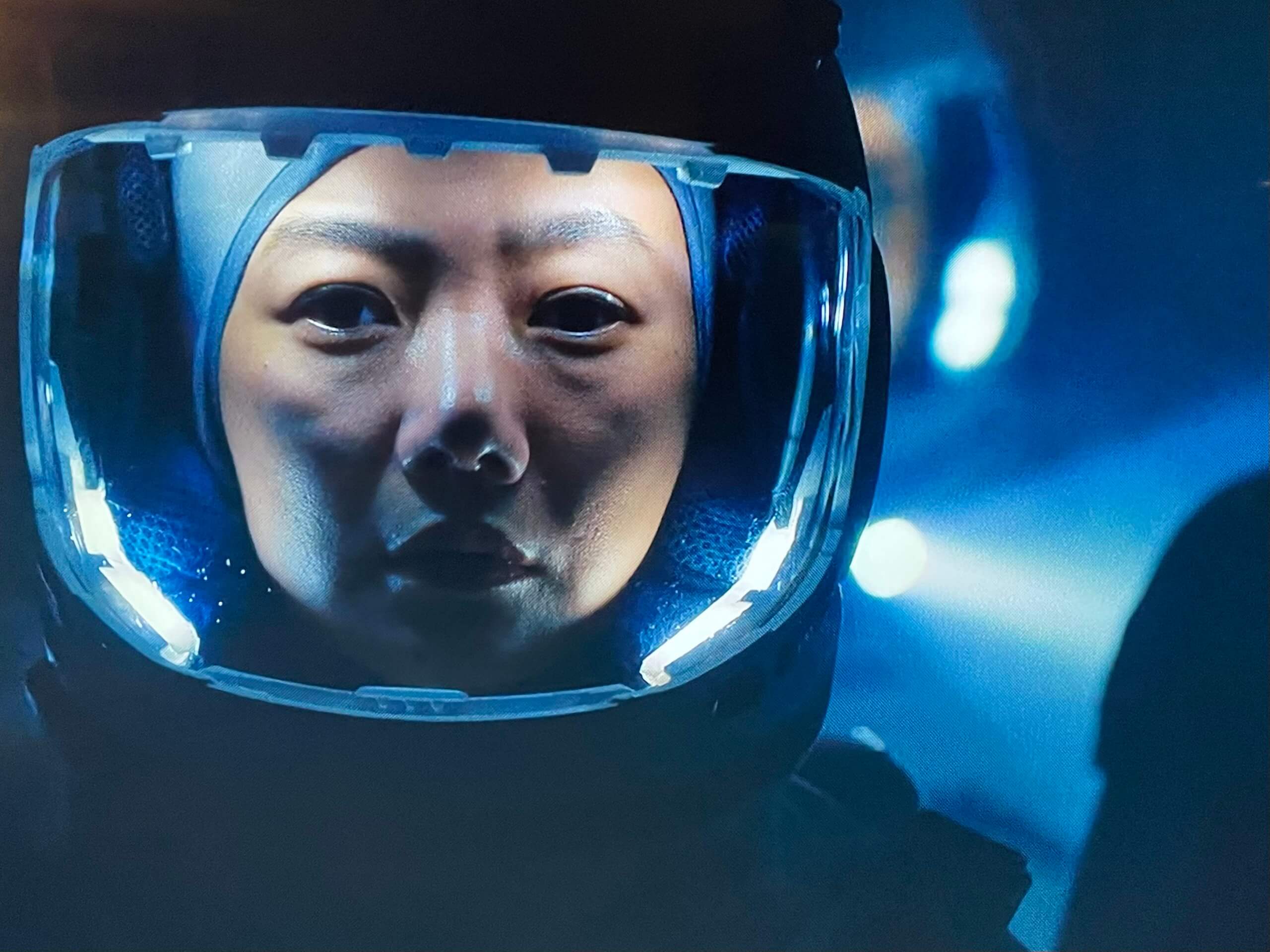
Longer Review
SILENT SEA is the story about a mission to the moon to find water. I rate this series PG-13. No sexual content in this production, but there are dead bodies, and some gore. Family-friendly if your teens are mature. It’s a fun, suspenseful ride.
The first episode quickly gives the viewer the high stakes for this mission. Drought has plagued the Earth. Water is the resource most valuable and due to its scarcity, the planet has become a wasteland. Water is rationed to such a degree, many have suffered physically, billions have died. The wealthy nations have gone into space to find a water source. Most abandoned the idea of finding water on the moon after searching, but the South Korean government kept snooping. There has been a top-secret program at a large moon station that was believed to have borne fruit, but suddenly…the experiment falters. Everyone dies all at once on the moon station. The earthbound directors, including Heo Sung-tae (pictured near end of review) initiate another mission to go to the station and investigate the truth, but secrets pulse underneath the surface of this mission and become one aspect of tension in the story. The authorities hold their cards close and the military and science leaders do not push back, though they suspect something fishy. This may or may not be an aspect of Korean-specific deference to authority, but the screenwriter exploits what I understand as deference in a way that serves the story. Also, this is where the nuanced acting plays such a powerful role in the unfolding of the narrative. The audience can see in the face of Bae Doona, the slight suggestion of twitch, a blink, a stern jaw…we see it, but barely and it helps us know that she understands that she is being deceived. Yet, in most of the outward behavior, she acts the true soldier. Doona is great at this nuanced acting, but she’s just one, among a number of these performers, who pull off such nuance. In my mind, THE SILENT SEA showcases superb writing and better acting than Squid Game. Click for a review of Squid Game

Once the mission lands on the moon, what unfolds reminded me of Ridley Scott’s Alien, in all the best ways. Yes, there will be corpses, tunnels, darkness, betrayals, a terrible and contagious sickness, but there will be one character who keeps her eyes on the prize. Dr. Song (Bae Doona) is intent on discovering the truth. In part, she seeks the truth because her sister is one of the corpses and the holder of many of the secrets. Doona as Dr. Song, pictured above, is a female lead in the Korean zombie series, Kingdom. To see my review of Kingdom, click here
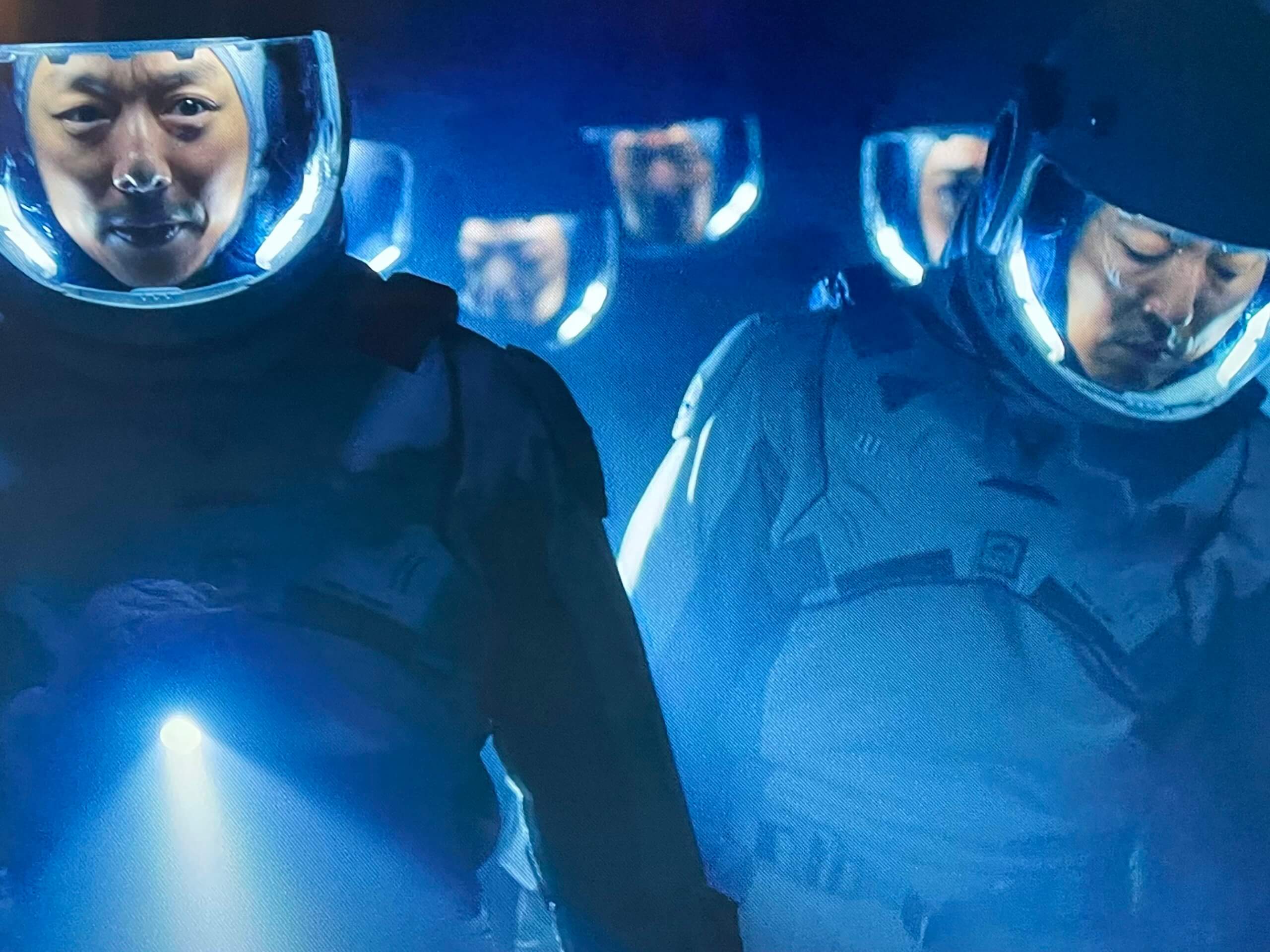
I beat this drum a lot but I do feel that Netflix streaming continues to find the best international productions and when it comes to science fiction, the Korean film/media community is putting out a lot of great product. Produced by Jung Woo-sung, directed by Choi Hang-Yong, who deftly handles the brilliant storytelling of screenwriter, Eun-Kyoi Park. Honestly, I think I could teach a five-hour course on writing with this series, moving scene by scene through the screenplay, in terms of a classic sci-fi thriller. Fun fact, this story (as did Scott’s Alien), closely follows the haunted house template. That means there are a few predictable tropes. The audience knows that the mission is doomed (at least the mission as it was originally conceived) as one by one, the team gets whittled down. Who will remain in the end…that is what the audience wonders. Regarding the various characters, the majority of them hold their own, each having his/her own arc, including the wise-cracking military scrub who just wants to go home…a longing the audience suspects will not be realized.

I highly recommend. THE SILENT SEA, and suspect that Netflix now has me pegged in its algorithm as a person who loves Korean-produced thrillers/sci-fi. I might need to give the Koreans their own category on my site. The product is so good, I can’t stop watching and when I watch, I always review.
ALL SYSTEMS RED, by Martha Wells, A No-Spoiler Review of the first novella in the Murderbot Diaries Series

ALL SYSTEMS RED is a story, entertaining and well-written, that one can read in about 4 hours. Rated PG-13 for adult themes. I read this novella on a flight from Minneapolis to Seattle. I flew on Delta and none of the airline’s tv/film options seemed very thrilling to me. I often try to see HBO or Showtime options when on a flight because I don’t subscribe to either of those services in real life. Thank goodness I had taken this book with me, hardback, but thin, lightweight and easy to pack because it’s only 127 pages.
And now, for my Short, No-Spoiler Review
I highly recommend ALL SYSTEMS RED for these 5 reasons.
- Original voice…the narrator has the appeal of an innocent, he/she is like a child, yet holds the capacity to narrate a futuristic society inhabited by humans and AI living and working together
- Genre bending…science fiction merged with mystery…in other words, a page-turner
- Thought-provoking ideas about AI and how future humans might understand morality/humanity in regards to AI
- Interesting world-building and a great set-up for subsequent stories
- ALL SYSTEMS RED would make a great audiobook. See the longer review for more
Longer Review:
Martha Wells has created a fascinating universe of humanity working and living off Earth, in space, in places that can only be reached via light-speed travel. She doesn’t fixate on the physics of the issue (regarding traveling across vast distances) but focuses on the gritty work life of humans and their bots. In the author’s futuristic world, full AI exist as sex workers and security units (SecUnits) and other helps in life. Also, some humans adopt robotic parts (augmented humans). So, there is a mix of how humans have integrated with tech and within the story world, there is little “judgment” about these realities.
While this is all true, the AI mind that narrates this story has a judgment about itself and humans. The view is not completely skewed toward disgust for humans, though there is some leaning in this direction. Granted, I’ve only read the first 1.5 novellas. But what works in the narrative is that Wells has put forward a more dispassionate, yet charming view of the world the way it is. I highly recommend these novellas as entertainment and am slowly discovering how they speak into deeper moral questions around humanity’s race toward the future, a future in which robots and artificial intelligence will be embedded. These books might appeal to the YA reader because the narrator is endearing and “young” feeling. The value in their education would be the discussion around tech and humanity’s future.
Regarding the narrator. The voice is absolutely charming. I did not listen to the book, but can imagine the voice. This book would be a pleasure to listen to.
To buy the first book, click on All Systems Red
Four of the series in hardback can be bought together. Click on Murderbot Diaries
For the least expensive version to try out novella #1, click on Kindle version: All Systems Red
For the audio version of novella #1, click on Audio of All Systems Red
SPACE SWEEPERS, A No Spoiler Review

5 Reason to Watch Space Sweepers, The Short Review
- characters, they’re funny, quirky and smart…They reminded me of many beloved STAR WARS characters
- Special effects, on par with cinematic space opera’s like Star Wars
- Family friendly, nothing offensive for parents trying to figure out what to show their kids
- Excellent space battles
- An ultimate choice for the main character(s) that packs an emotional punch
 The Longer Review
The Longer Review
This film assumes a space opera vibe and so reminded me of Star Wars, yet felt original. The pacing of this screenplay gave exactly the right amount of info while embedding a few nuggets that made me go back a rewatch portions. That was rewarding and I loved the heartbeat of the story’s core…the transformation of a rogue…think of Han Solo and his journey.
Not that this story only bleeds a happy ending. There is a tragic trade that takes place, a brutal choice for the main character. However, the overall adventure ranked above my expectations. When I’m streaming something online like this, I’m not expecting brilliance, but when it’s Korean made, I am coming to expect top-notch production. The Korean film industry is doing something right by focusing on great storytelling and upping the game at every turn when it comes to investing in the visual feast. SPACE SWEEPERS is no exception.

I will continue to seek out, watch and review Korean-produced scifi/horror/speculative fiction because in the last 2 years or more, the flow of great content is undeniable. For more Korean-productions that I’ve reviewed, see:
KINGDOM, A Review of a Korean-Made Masterpiece
SQUID GAME, A Review without Spoilers
TRAIN TO BUSAN, A No Spoiler Review
DUNE Part 1, The film. A No-Spoiler Review

In a similar way that Peter Jackson pleased both the non-reading audience and the hyper fan of the LOTR books, it looks like Villeneuve will do the same for the his audience and fans of the novel, DUNE.
DUNE, the film, is the first of two. It’s only about half of the novel (yet another reason to entice your teen to read the novel), and there could be more films if Villeneuve decides to continue with the novel’s sequels. We’ll see how that goes. The later books are brilliant but probably more challenging for the average audience member to consume. Herbert’s world is a complex and mostly unhappy place on almost all counts.
First, The Short Review of DUNE
5 Reasons to See this Film, Especially if you are a Scifi Fan…
- Mostly pitch perfect and accurate (close to the novel) storytelling
- Herbert’s DUNE is a foundational work in the scifi genre and has a huge international following. Without DUNE, Star Wars might never have been made.
- A vision within the story that transcends culture and era
- Great casting
- An epic visual feast
Now, for the Longer Review…
If you want to go deep, super deep on DUNE, there are papers written, blog posts and articles that speak to why the story DUNE is one that has reverberated in many cultures, especially subjugated cultures, since it was released in 1965. This article is a good one, in case you want more breadth about the history. Click on the link for the Guardian’s penetrating reflection. DUNE article, Guardian.

True, the viewer is only getting a third of the character depth in the film version and for that reason, I encourage all to read (or re-read) the novel. It ages well. But, even if you don’t read the novel, Paul, Leto, Jessica, Duncan, Kynes and the Fremen come across very close to the novelist’s vision. I had two observations of change that caught my attention: Villeneuve did not portray the Atreides’ mostly male in-house staff accurately in terms of their suspicion of Jessica as the betrayer. Their suspicion of the one woman in the mix comes through in the novel, not in the film. Also, the gay Baron Harkonnen is a known child predator in the novel. I can guess there are many reasons Villeneuve decided to forgo this portrayal of the only gay character in the story world. Let him be obese and disgusting in the visuals, but diminish his child predator persona. That seems like a wise decision on many fronts.
The portrayals I loved:
Arakkis, the worms, the Fremen, the sitch, the general feeling of the Bene Gesserit, the Harkonnens, the Sardaukar, the ornithopters, Arrakeen, the costumes (including the stillsuit)…these are all perfect, as are the actors’ portrayals of their characters.
Overall, DUNE was worth the time and money. I highly recommend this film.

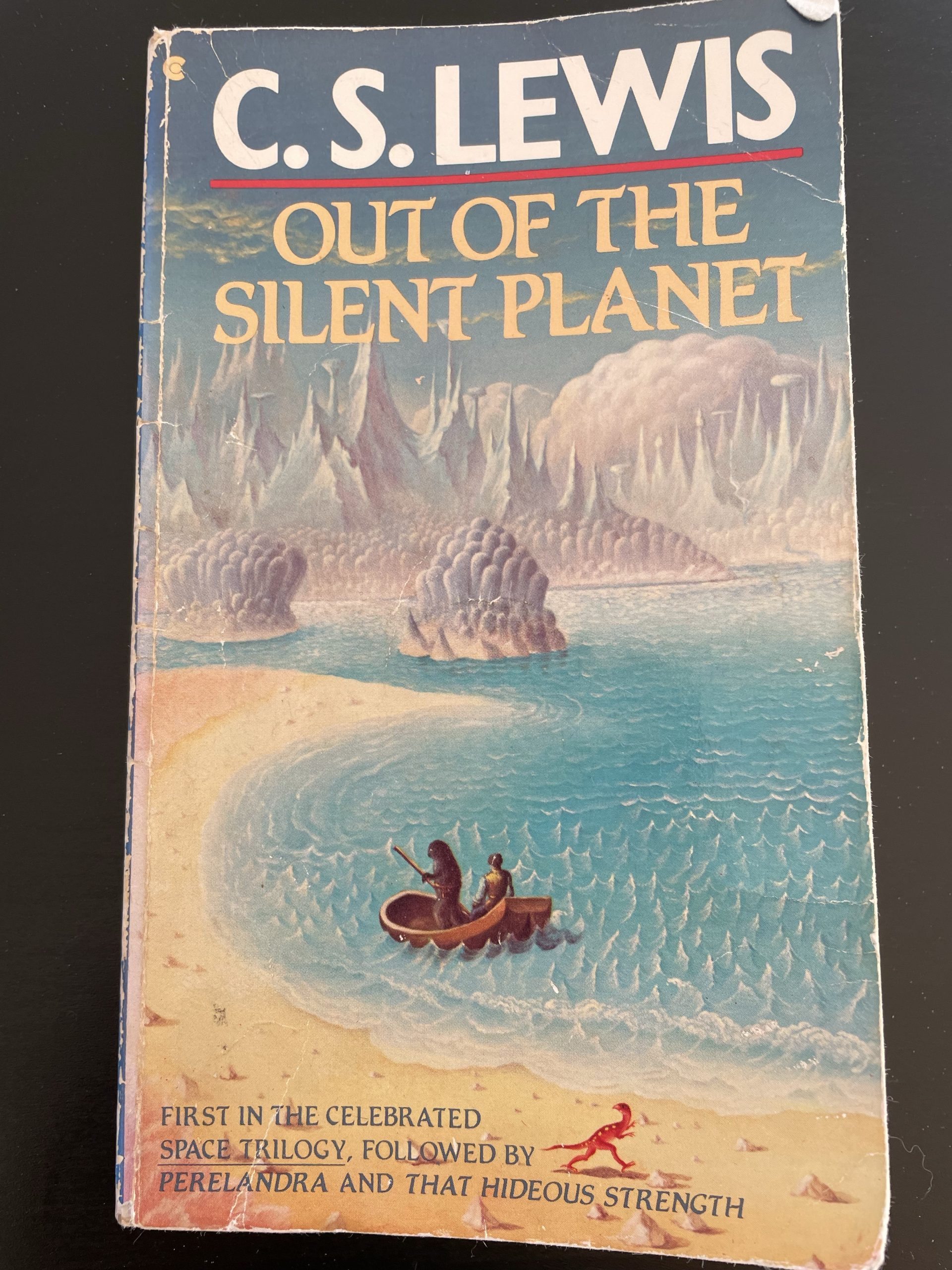

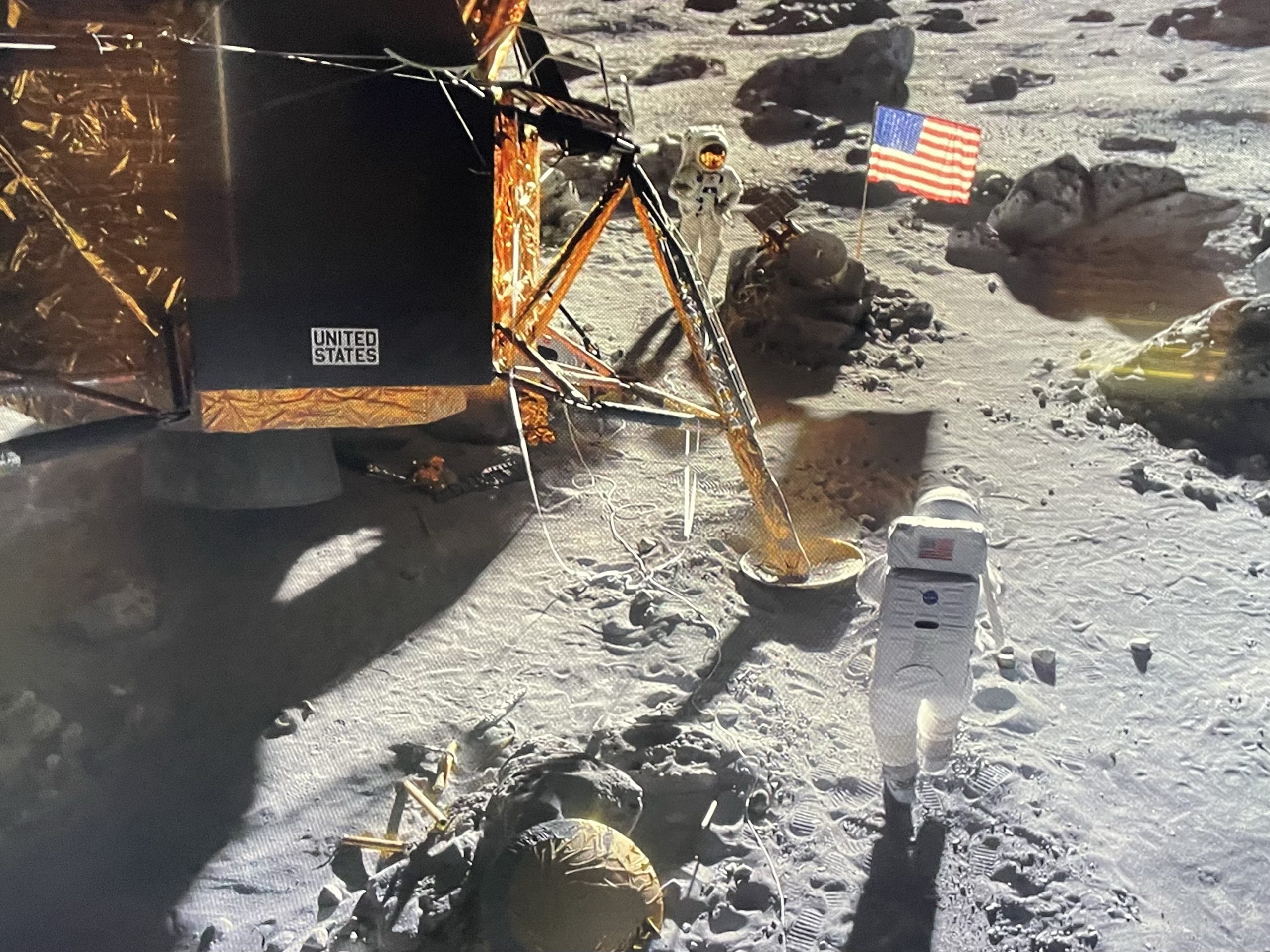

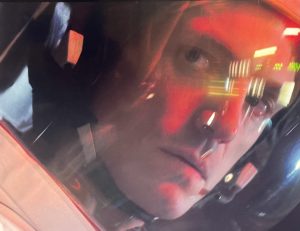
 The Longer Review
The Longer Review

